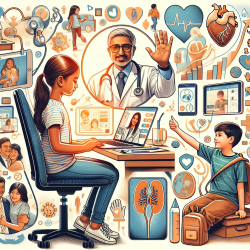Introduction
In the ever-evolving landscape of healthcare, the integration of technology into therapeutic practices is not just a trend, but a necessity. The ACQUIRE-ICD trial, a comprehensive eHealth intervention, offers valuable insights into how technology can enhance patient outcomes. While the study focuses on patients with implantable cardioverter defibrillators (ICDs), its implications extend far beyond, offering lessons that can be applied to the field of speech-language pathology, particularly in improving outcomes for children through online therapy services like those provided by TinyEYE.
Understanding the ACQUIRE-ICD Trial
The ACQUIRE-ICD trial is a national Danish randomized controlled trial that evaluates the effectiveness of a comprehensive interactive eHealth intervention. This intervention aims to improve patient-reported and clinical outcomes by incorporating goal-setting, symptom monitoring, psychological treatment, and an online community network. The trial's primary endpoint is device acceptance, assessed through the Florida Patient Acceptance Survey, with secondary endpoints including health status, anxiety, depression, and cost-effectiveness.
Key Takeaways for Practitioners
While the ACQUIRE-ICD trial is specific to cardiac patients, its methodology and findings can inspire speech-language pathologists to adopt similar strategies in their practice:
- Patient-Centered Approach: The trial emphasizes the importance of personalized care. In speech-language pathology, this translates to tailoring therapy to each child's unique needs and preferences, ensuring that interventions are relevant and engaging.
- Use of Technology: The eHealth platform used in the trial allows for continuous monitoring and interaction. Similarly, online therapy platforms can facilitate ongoing communication between therapists, children, and their families, ensuring that progress is tracked and adjustments are made in real-time.
- Comprehensive Care: The trial's inclusion of psychological support highlights the importance of addressing emotional and mental health alongside physical health. Speech-language pathologists should consider the holistic needs of children, integrating support for emotional and social development into their therapeutic practices.
Encouraging Further Research
The ACQUIRE-ICD trial underscores the need for ongoing research into the effectiveness of eHealth interventions. Speech-language pathologists are encouraged to explore how technology can be leveraged to improve therapeutic outcomes for children. By conducting studies and sharing findings, practitioners can contribute to a growing body of evidence that supports the integration of technology into therapy.
Conclusion
The ACQUIRE-ICD trial offers a compelling case for the integration of eHealth interventions in healthcare. For speech-language pathologists, it serves as a reminder of the potential that technology holds in transforming therapeutic practices and improving outcomes for children. By adopting a data-driven, patient-centered approach, practitioners can ensure that their interventions are not only effective but also empowering for the children they serve.
To read the original research paper, please follow this link: Effectiveness of a comprehensive interactive eHealth intervention on patient-reported and clinical outcomes in patients with an implantable cardioverter defibrillator [ACQUIRE-ICD trial]: study protocol of a national Danish randomised controlled trial.










